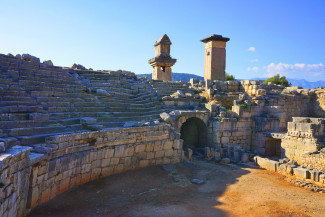
Johns Hopkins UniversityEst. 1876
America’s First Research University
The Dynamics of Imperialism and Foreign Relations: A Study of Persia's involvement in Foreign Wars with John Hyland

The Satrap and I: Writing Persian Interventions
My fascination with Achaemenid Persia’s interventions in Greek conflicts began in a college seminar on the crisis of the Greek city state, when I first read Book VIII of Thucydides’ History of the Peloponnesian War. To my surprise, the character who intrigued me most was not a Greek but a Persian, the satrap Tissaphernes, who offered aid to Sparta’s fleet against Athens in 412-411 BCE but failed to deliver on his promises. While admitting lack of certainty on his motives, Thucydides guesses that Tissaphernes feared the winner of the Greek struggle would threaten the Persians; therefore, the historian alleges, he crafted a secret policy to sabotage his allies, balancing Sparta and Athens against one another and prolonging their destructive stalemate. Tissaphernes’ apparent employment of defensive Realpolitik seized my attention – I wrote a twenty-page paper but couldn’t stop thinking about the topic, and returned to it at greater length in my senior honors thesis. I found that numerous studies presented Tissaphernes as either a brilliant diplomat or cunning villain, but failed to place him in an adequate Persian imperial context; this forced me to begin grappling with the absence of Persian narrative sources that might explain Tissaphernes’ policies on his own terms.
The search for Persian contexts introduced me to the pioneering scholarship of David M. Lewis and Pierre Briant on Greek historiography and the Achaemenid empire, and eventually led me to graduate school in Chicago’s interdisciplinary Committee on the Ancient Mediterranean World. There, after immersive study of Greek and Ancient Near Eastern languages and cultures, I made Tissaphernes the focal point of my Ph.D. dissertation on Thucydides’ and Xenophon’s representations of Persia. Once I moved to Virginia to join the Department of History at Christopher Newport University, I set to work on turning the dissertation into a book, but discovered that my historiographic study hadn’t yet answered the deeper historical questions that had gnawed at me since college. Why did Persia support Sparta after a lengthy period of peaceful coexistence with Athens? Given Sparta’s dependence on Persian funds, why should Tissaphernes have developed a strategy rooted in fear of the Spartans, and how likely was he to convince the king to reverse his initial alliance policy? After the temporary break-down of Tissaphernes’ relations with Sparta, why did the king reassert his commitment to Spartan victory and send Cyrus the Younger to bring about this outcome? And how did involvement in Greek conflicts intersect with Persia’s other priorities as a world power, especially relations with its rebellious province of Egypt?

The exploration of these questions grew into Persian Interventions, which examines the sources for the ideological, political, and economic contexts of Persia’s Greek relations. Persia’s royal proclamations and iconography of universal empire clashed with Thucydides’ theory of its defensive balancing of smaller Greek neighbors; the ideology of Persian imperialism emphasized the kings’ paternal authority across the world, and their obligation to bring peace and order to unruly dependents at the empire’s margins. On the other hand, economic documents such as a customs record from Persian Egypt demonstrate that peaceful coexistence with Greek neighbors could generate sufficient profit to outweigh the expense of naval warfare against Aegean opponents. Persia and Athens were not inevitable enemies; but Darius II sided with Sparta in a context of Athenian economic and naval decline, expecting Athens’ rapid surrender and knowing that a rapid victory for new Greek clients would display Persia’s universal power. Tissaphernes’ troubles with the Spartans are unlikely to have resulted from reluctance to allow them to win; rather, they stemmed from the unexpected duration of the conflict, the consequent expenses involved in subsidizing naval warfare, and diplomatic missteps in dealing with Greek allies whose interests diverged from the empire’s.
Frictions between ideology and pragmatism, and between the intentions of imperial patrons and clients who viewed themselves as fully autonomous actors, are hardly unique to ancient empires, and the lessons of our own times have influenced my questions about the ancient evidence. In bringing the book to completion, I have come to view Persia’s involvement in Greek wars as a rich case study in the dynamics of imperialism and foreign relations, and I hope that it will speak to an audience that extends beyond ancient specialists.
I’ve been writing about Tissaphernes for more than twenty years, and while I’m excited about moving on to future projects, it’s a little hard to let him go. In May 2017, I visited the Turkish site of Xanthos, where an inscription in the indigenous Lycian language comments on dealings between Tissaphernes and local vassals of Persia. I’m working on a paper on the monument for an upcoming conference, so for the time being I’ve managed to delay saying goodbye to the satrap who set me on the path to becoming an ancient historian.
John O. Hyland is an associate professor of history at Christopher Newport University. He is author of Persian Intervenions: The Achaemenid Empire, Athens, and Sparta, 450−386 BCE


